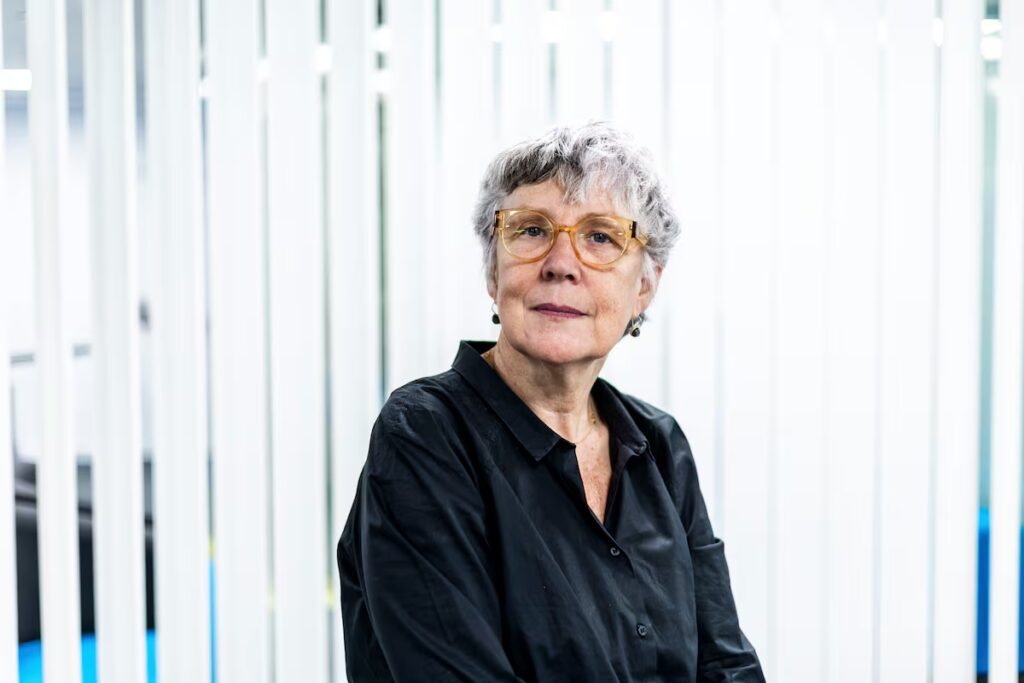
The gaze of Grainne O’Hara (Dublin, 58 years old) has seen migratory routes cross half the world in her 32 years of work at UNHCR, the United Nations High Commissioner for Refugees. Now, as a representative in Spain, one of the European countries most affected by the arrivals of foreigners at its borders, he has before his eyes the implementation of the European Pact, the instrument that seeks to reorganize procedures for people seeking international protection and migration in general. He finds in Spain “good political will, both in the government and in the communities” to improve in these aspects, but he also hopes that it will consolidate with “determination and resources”. All this, he states, would help tame the xenophobic and criminalization discourse that is spreading like wildfire.
Ask. Compared to a European average of 51%, Spain accepts around 13% of asylum and protection requests, to which must be added its policies to support Venezuelans. What do you think of those figures?
Answer. With humanitarian protection for Venezuelans, who represent the largest group in the Spanish protection system, and temporary protection for Ukrainians, the sum amounts to 47%, according to our data. It corresponds to the reality faced by the asylum system in Spain, which is otherwise inclusive and decisions are made in a context of solidarity and openness towards applicants. But the operation is far from perfect: it takes too long to get an appointment to apply for asylum and this is just the entry point. A wait of months means that the immediate needs of children, women and victims have not been assessed. There are also challenges related to the quality of interpretation services. All these processes must be accelerated and achieve faster and quality decisions.
Q. Is it a question of resources or political will?
R. More resources and better practices are needed. For example, police training for initial interviews with foreigners, offered by UNHCR. But there is a lot of turnover among current police officers; A longer stay in those positions would help, even if with breaks, because (dealing with people with these problems) generates considerable emotional exhaustion. Interpreters, for example, are a matter of resources. If a clear agreement is not reached (with the interviewees), asylum could be granted to those who do not need it and the money would be wasted.
Q. So, is there political will or not?
R. I think so, but there is a lot of work to do. The will must translate into actions, good faith must be accompanied by resources and determination.
Q. Allegations of fraud in the system for nominating asylum seekers are constantly mentioned. What do you think?
R. That there is fraud, yes, but that the entire asylum system is a fraud, is not my experience. In interviews, the vast majority tend to tell the truth. Rather than talking about fraud, which seems to refer to something done on purpose and organised, it would be better to say that there is poor application by the system.
Q. If you rush the interview process, you also risk not adequately assessing the situation faced by these people.
R. YES. There has to be a balance according to needs, with children, traumatized people… It takes time. The capacity of the system must be adapted to each need to give more attention and resources to the most important cases and accelerate some profiles that do not have such consideration, identifying nationalities with a low rate of need for asylum.
Q. Where is the line between giving asylum to a child who leaves his country due to poverty or due to violence?
R. Children are children, they all have a vulnerability and the Spanish system recognizes this, hence the figure of protection for those who do not belong to the mental hospital. You have to listen to them. Many of those arriving from Mali have experienced poverty, but have also faced threats of recruitment by irregular forces. Among girls, there is a high profile of violence, forced marriages, genital mutilation… This marks the distinction between a situation of poverty and the need for protection. Poverty alone does not lead to asylum consideration.
Q. Are minors aware that they can request asylum?
R. They are not a homogeneous group, as those negative narratives say. Some don’t even know who to talk to, others have family ties and bring up the idea of reunion. This is why we at UNHCR find this fraud terminology uncomfortable; When you talk to them they tell you the truth.
Q. When and why does a country go from being supportive to becoming suspicious and criminalizing migrants?
R. One factor is the circulation of misinformation about people from elsewhere. It happens in every society, this is how we are as human beings. The circulation of false information creates jealousy, division and rejection. People tend to give more credibility to fears, some of which are legitimate, but to understand that refugees do not represent a threat, transparent information is needed against deliberately manipulated narratives.
Q. The Canary Islands have a high influx of children. Is the best interests of the child taken into consideration?
R. There are gaps, but there is good faith and the quality of discussion between the actors involved is improving. Yes, there are accusations and counter-accusations: if the Canary Islands are to blame, if that ministry is to blame. The Canary Islands are facing a presence of children that exceeds their capacity, but the paperwork (of minors to be transferred to the peninsula) has not been prepared well and further delays have occurred. The Ministry of Migration also has the great responsibility of offering asylum to those who have requested it, and not only that. But we move forward, suitable places are identified (for minors) and the transfer capacity accelerates.
Q. The Balearic Islands are recording an increase in arrivals. Has the case of the Canary Islands been taken into account or are the same mistakes being made?
R. The Balearic Islands have always been a route. This year the Atlantic route has recorded 12,919 transfers so far, 58% fewer than in 2024, but the end of the year has not yet arrived. The Mediterranean, which includes routes to the Balearic Islands, Ceuta and Melilla and the Andalusian coast, has seen almost 15,000 arrivals this year. I think they’ve learned. They mobilised, the Government made visits to immediately expand reception and see the transfers to the provinces. But we need to work harder, the path will not decrease.
Q. Are these drops in arrivals because fewer people are leaving or because border policies are having an effect?
R. It’s not because there aren’t people fleeing wars. Measurements (taken) at exit points influence routes. They leave less from Mauritania across the Atlantic and do so from further south; They are longer and more dangerous journeys where people lose their lives, this is worrying.
Q. The agreements that Giorgia Meloni’s far-right government in Italy signed with Tunisia and Libya to control their borders have helped reduce irregular arrivals. Does it happen in Spain?
R. Spain is experiencing it directly, which is why the increase in the Balearics: they come from Tunisia and Algeria, when before they went to Italy. Yes, part of what we see is due to states’ bilateral or multilateral policies, (so) the answer is yes. For example (between) Spain and Mauritania. Mauritania is a country very open to refugees and is now working with Spain, there are Spanish and European investments to improve asylum there, and this has its impact on the routes.
Q. What impact have Donald Trump’s cuts policies had on you?
R. The cuts have caused a nearly 30% reduction in our global budget, affecting 5,000 jobs. In Spain we cut 23% of jobs, we closed our headquarters in Melilla, we only send missions. In Malaga we had two colleagues and now only one, in Algeciras and Ceuta we went from three to one; In Madrid we didn’t make many cuts, but we didn’t finish the year. We used to work with African interpreters to help the system, but we no longer have any and our legal advice to applicants has also suffered.
Q. The European pact will enter into force in June. What do you suggest for Spain?
R. Speed and quality in processes. The government is considering legislative changes relating to asylum and immigration, and perhaps to the regulation of administrative litigation. It will be interesting to delve deeper into the repatriation system, the concepts of safe third countries and readmissions in those countries where more accelerated procedures can be applied, but always considering all the risks. There are also triage processes to more quickly determine which people have special needs and an independent monitoring mechanism.
Q. Isn’t it too late to arrive in June?
R. There is so much work in such a short time. And obstacles have been found, for example, in the solidarity mechanism, which provides technical and financial assistance to the countries with the greatest (migration) burden. It’s late, yes.





